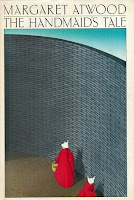In a future America, religious extremists have imposed a theocracy in which fertile women have only one purpose.
Book Review: The Handmaid's Tale was begun in 1984, but even today finds resonance with readers. It's not SciFi, it is speculative fiction, just as is It Can't Happen Here by Sinclair Lewis. And like that book (and unlike most dystopian novels, which begin mid-tyranny) it describes the taking over of the commonplace American society by a tyrannical government, now renamed Gilead. Several pages in, the reader begins to suspect that this may be a secret book, perhaps not to be read by men. But perhaps not strictly feminist either, as so many female characters eagerly join in the tyranny of other women, our unnamed protagonist is no bold crusader (no Hunger Games or Divergent heroine here), and the Resistance appears well-populated by men. Interestingly, although Gilead is women-centered, it is not controlled by women. The ending of the book, though seemingly open-ended, is hopeful, and I liked it for that. The Handmaid's Tale is immensely thought-provoking; I might be able to write another 300 pages about this book. It's also a scary and valuable warning to be on our guard. When protectors of rights and liberties appear to overreact to threats, it's to avoid a future such as this. But heretical as it may be, there are places where this book is based heavily on our emotions, our fear of such a society, and as such some flaws appear. Logically, this is not the society that men would create given the chance (the implication in the book being that women had a say in creating the society). It also seems unbelievable that such a change, such a complete reorientation of thinking, could occur in such a short time. For instance, in just a few years the main character, a strong independent adult woman, loses much of her abilities, her personality, and periodically becomes feeble and ignorant. While this may be explicable (PTSD, shock, Stockholm syndrome, etc.) in terms of the story, it still felt unpersuasive given that at others times she does assert her strength (agency, for you lit majors). Further, the "Historical Notes" appended at the end were clunky, unnecessary, and distracting (much like the Harry Potter epilogue). It seemed as if Atwood didn't trust her reader, and the little valuable information there could have been better presented. Much of this is subjective, but I'll just mention one more. The underground railroad to Canada is called "The Underground Femaleroad." That just seems like a clunker to me, and I can't imagine anyone coming up with such a term. For me, none of these bumps undermined the power of the story or my enjoyment of it. The fairly minor flaws just kept it from being as perfect as I would have liked it to be, as it deserved to be. The Handmaid's Tale is soon to be a television series, is a (not well-reviewed) 1990 movie, and is well worth reading. [4★]

No comments:
Post a Comment